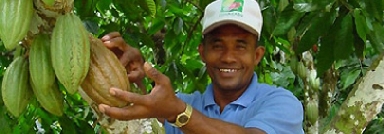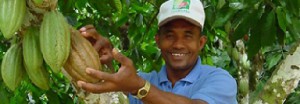Join us at the Global Exchange Fair Trade Store in San Francisco for a Dominican Republic Fair Cocoa Harvest Global Exchange Reality Tours Report Back by honored participants and Fair Harvesters Keri Ferencz & Hime Levine!
Date: Wednesday, July 28
Time: 5:30 – 7:30pm
Where: 4018 24th St, San Francisco CA 94114 (map)
As participants in this year’s Fair Cocoa Harvest Reality Tour, Keri and Hime traveled to the Dominican Republic where they worked along-side farmers of a Fair Trade cocoa cooperative (CONACADO) to harvest cocoa. Having shared in the daily lives of small-scale farming families, they can share with us their understanding of what Fair Trade means for producers.
Fair Harvest is not intended to be a tour or tourist visit, but rather to be a lived experience that will motivate the participants to be committed fair trade advocates when they return. Spend your vacation harvesting social justice while learning about the beautiful culture, biodiversity, sustainable development and history of the Dominican Republic!
Learn about the importance of Fair Trade in the cocoa industry and how certification and economic alternatives can dramatically improve the lives of producers.



